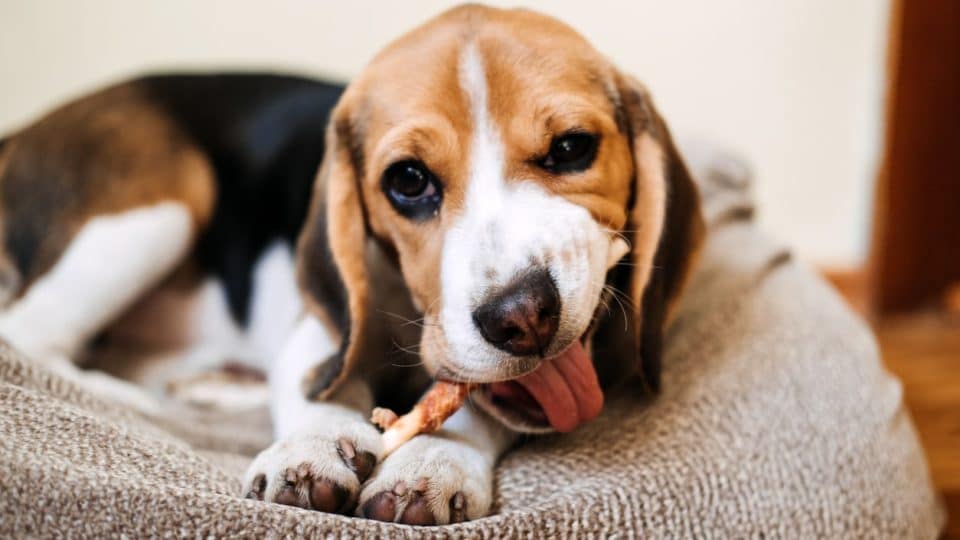As responsible pet parents, we always want to provide the best for our dogs, including a balanced and nutritious diet. Some parents might consider bones as part of their pup’s diet. But can dogs actually eat bones? Yes and no.
Dogs are naturally carnivorous, and in the wild, they would consume bones as part of their diet. Bones can provide essential nutrients, dental benefits, and mental stimulation for our canine companions. However, not all bones are safe for dogs, and precautions must be taken to avoid potential hazards.
Below, we’ll explore the risks and benefits of giving bones to dogs, both cooked and raw, and provide essential guidelines to ensure your canine friend’s safety and wellbeing.
Can Dogs Eat Cooked Bones?
“When you cook bones, you weaken the bone, allowing for splintering,” says Meaghan Thomas, DVM from East Ridge Animal Hospital in the USA. She explains these shards can severely damage your dog’s GI (gastrointestinal) tract. Certain animal bones, such as chicken and fish, tend to splinter more easily than others, increasing the risk to dogs.
If a dog eats a cooked bone, it could take anywhere from a few hours to a few days for symptoms to appear. Common signs of bone ingestion include drooling, vomiting, diarrhoea, abdominal pain, and reluctance to eat.
If you suspect that your dog has ingested a cooked bone or notice any concerning symptoms, Dr Thomas advises calling a vet and explaining the symptoms. “Sometimes, surgical intervention may be required,” she says. “Other times, medical management may suffice. But a veterinarian should be involved in helping you make that decision.”
Even though most pet parents know not to give their dogs cooked bones, dogs have a talent for getting hold of things they shouldn’t. To prevent your pup from rummaging through the rubbish and finding discarded bones, be vigilant and keep cooked bones out of their reach.
Are Raw Bones Safe For Dogs?
Raw bones are generally safer for dogs to consume. They are softer and less likely to splinter, reducing the risk of choking or internal injuries. However, this doesn’t mean all raw bones are safe. Safe raw bones for dogs come from animals such as beef, lamb, and venison. Raw bones from these animals can provide dental benefits by helping to clean teeth and massage gums. Additionally, raw bones offer mental stimulation, satisfying a dog’s natural instinct to chew.
While raw bones can be beneficial, there are some types that should be completely avoided. Bones from small animals like chickens and rabbits can be hazardous due to their small size and tendency to splinter. Furthermore, certain bones within an animal’s body, such as rib bones, are more likely to splinter and should be avoided.
Lastly, consider the size of the bone in relation to your dog’s breed. Larger breeds may handle larger bones better, but all dogs should be supervised while chewing on bones to reduce the risk of choking or ingestion of large bone fragments.
Can Dogs Chew On Bones?
Chewing on bones can provide several benefits for dogs. Some of the benefits of bone chewing include:
- keeping their teeth clean by reducing plaque and tartar buildup
- helps to alleviate boredom and anxiety
- stimulates saliva production, which can aid digestion and contribute to better oral health
While chewing on bones can be a rewarding experience for dogs, it’s crucial to ensure their safety during the process. Be mindful of any signs of distress or discomfort while your dog chews on a bone, and never leave them unattended with a bone for extended periods.
There isn’t a specific time of day better for giving dogs bones, but some pet parents prefer to provide them during quiet times when they can focus on chewing without distractions.
How To Safely Buy, Store & Dispose of Bones
To minimise risks associated with bones, take appropriate measures when preparing, storing, and disposing of them. When purchasing animal bones, consider buying fresh and locally sourced bones from reputable butchers or pet shops. This reduces the risk of sanitary problems associated with improperly handled or processed bones. Avoid buying processed bone treats and opt for whole, raw bones instead.
Additionally, choose bones proportionate to your dog’s size, avoiding small bones for large breeds and vice versa. Always supervise your dog while they chew on a bone, and promptly remove the bone if it becomes too small or splinters.
If you decide to prepare raw bones at home, always handle them with clean hands and avoid cross-contamination. Store raw bones in the refrigerator or freezer to prevent bacterial growth and ensure they are not left out too long.
When Should Dogs Not Chew Bones?
There are certain scenarios when dogs should avoid chewing on bones. Dogs with pre-existing health issues, such as dental problems, digestive disorders, or a history of GI obstructions, should refrain from chewing on bones.
Additionally, if multiple dogs are present, avoid giving bones if it leads to protective behaviour, jealousy, or aggression.
Can Dogs Have Bone Treats & Dog Chews?
It’s important to differentiate between raw animal bones and bone treats or dog chews. Bone treats are often processed and can pose choking hazards or contain harmful additives. Meanwhile, dog chews are an often-recommended alternative because of their durability and variety. Some popular dog chews (even though they might look gross) include pig ears, dental chews, beef tendons, rawhide, and bully sticks. Your vet can recommend the best dog chew for your pup!
If you choose to give your dog bones, Dr Thomas says to always take the proper precautions and do your research beforehand. Always prioritise your dog’s safety and consult your veterinarian for personalised advice on bone consumption based on your dog’s age, breed, and health condition.



